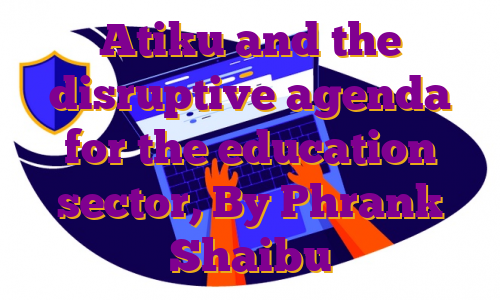
The policy framework explains how the Technical and Vocational Education and Training (TVET) systems shall be improved and capacitated to deliver quality and relevant training and assessment aligned to the Nigeria Skills Qualification Framework (NSQF).
This is the reason that Atiku plans to drive the required investments that will enhance the absorptive capacity of Technical and Vocational Schools: The former vice president is worried that currently, vocational and technical colleges have inadequate absorptive capacity – there are less than 400 TVET colleges nationwide, with total enrolment of less than 200,000 students.
And because this is a bottom-up approach, Atiku plans to increase primary school enrolment from 60% to 90% and the graduation rate from 63% to 82% by 2027. The education agenda envisages an increase in secondary school enrolment from 47% to 80% and the graduation rate from 56% to 75% by 2027.
What’s more? Atiku’s 5-Point Plan encourages and promotes more schools for girls in science and technology and generally stimulate interest in science courses for women. Incentives for the private sector to set up additional Vocational Enterprise Institutes and to partner with the public sector in skills provision is also on the cards.
On tertiary education, the central government shall select from existing universities and develop one university in each geo-political zone as Centre of Excellence. The universities shall be encouraged to charge user fees at market rates under a partnership between the federal, state and local governments.
To be sure, nothing in all this is particularly extraordinary. All of these steps and many others in the pipeline are measures that should be taken by any government which desires to place its education sector on a sound footing. The reasons for the planned deep and painful surgery being contemplated by Atiku should make a lot of sense to all concerned because the Nigerian story is the stuff that paradoxes are made of. It is the story of poverty and illiteracy in the midst of huge potentials.
An instant revelation of the challenges that confront the nation’s education sector is the fact that, UNICEF statistics reveal that, Nigeria has more than 18.5 million children who are out of school, which accounts for 47% of the global out-of-school population.
Furthermore, Nigeria is among the four worst-performing countries in this area since 1999. These low participation rates perpetuate high illiteracy rates in Nigeria, accentuated along regional lines, with even lower participation in the impoverished rural parts of the country.
But access is not the only challenge facing the education sector: There are critical challenges with regards to quality, relevance and equity. Nigerians presently spend in excess of $1 billion annually to acquire education outside the country. This represents a significant leakage in the economy, particularly when a fraction of the amount over five years can make a huge improvement in the country’s health care and educational systems.
This appalling back story to the sector’s dysfunction is what has fired up Atiku to do a complete overhaul of this all-important sector. If elected, President Atiku will ensure that more parents enrol and keep their children in school. The Wazirin Adamawa believes that strengthening the education system in a manner that makes it more efficient, more accessible, more qualitative and relevant to the needs of the Nigerian economy and society is a task that must be done.
Phrank Shaibu is Special Assistant to Atiku Abubakar on Public Communication.
Support PREMIUM TIMES’ journalism of integrity and credibility
Good journalism costs a lot of money. Yet only good journalism can ensure the possibility of a good society, an accountable democracy, and a transparent government.
For continued free access to the best investigative journalism in the country we ask you to consider making a modest support to this noble endeavour.
By contributing to PREMIUM TIMES, you are helping to sustain a journalism of relevance and ensuring it remains free and available to all.
Donate
TEXT AD: Call Willie – +2348098788999

(function() {
var _fbq = window._fbq || (window._fbq = []);
if (!_fbq.loaded) {
var fbds = document.createElement(‘script’);
fbds.async = true;
fbds.src = ‘//connect.facebook.net/en_US/fbds.js’;
var s = document.getElementsByTagName(‘script’)[0];
s.parentNode.insertBefore(fbds, s);
_fbq.loaded = true;
}
_fbq.push([‘addPixelId’, ‘756614861070731’]);
})();
window._fbq = window._fbq || [];
window._fbq.push([‘track’, ‘PixelInitialized’, {}]);
!function(f,b,e,v,n,t,s){if(f.fbq)return;n=f.fbq=function(){n.callMethod?
n.callMethod.apply(n,arguments):n.queue.push(arguments)};if(!f._fbq)f._fbq=n;
n.push=n;n.loaded=!0;n.version=’2.0′;n.queue=[];t=b.createElement(e);t.async=!0;
t.src=v;s=b.getElementsByTagName(e)[0];s.parentNode.insertBefore(t,s)}(window,
document,’script’,’https://connect.facebook.net/en_US/fbevents.js’);
(function(d, s, id) { var js, fjs = d.getElementsByTagName(s)[0]; if (d.getElementById(id)) return; js = d.createElement(s); js.id = id; js.src = ‘https://connect.facebook.net/en_GB/sdk.js#xfbml=1&appId=249643311490&version=v2.3’; fjs.parentNode.insertBefore(js, fjs); }(document, ‘script’, ‘facebook-jssdk’));


